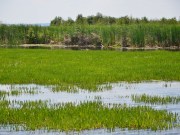By: Mike Anderson
With the number of positive COVID-19 cases rising to seven in York Region, Dr. Karim Kurji, York’s Medical Officer of Health, says there is still no evidence of the novel coronavirus spreading in the community, and the risk to residents remains low.
However, he issued a stark warning to faith and community leaders to think twice about holding large events for upcoming religious holidays like Passover and Easter.
Speaking at a news conference held on March 6, Dr. Kurji stopped short of issuing an outright ban but said that large events could increase the risk of COVID-19 spreading in the community.
“The main risk comes from somebody breaking self-isolation and coming into a large event that one may have organized,” Dr. Kurji said. “This can happen because a person didn’t fully understand their responsibilities during self-isolation, language barriers, or other reasons.”
“Unfortunately, we don’t have 100 per cent assurance that every traveller from a high-risk place, the newest being Iran, observes the 14-day period of self-isolation, even though we may call them frequently,” Dr. Kurji added.
Dr. Kurji is concerned that if someone breaks self-isolation and spreads COVID-19, Public health investigators may not be able to conduct case investigations for large numbers of potentially infected people. Such an outbreak would also severely task the health-care system, which is already under pressure.
“That would be a great strain on our resources, a strain on laboratory resources as far as testing goes, and also a large number of members of congregations may well have to go into self-isolation depending on what follows,” Dr. Kurji said.
If faith and community leaders decide to proceed with events, Dr. Kurji wants them to mitigate the risk by keeping the event small or breaking it up into smaller groups. He also wants them to curtail activities that could spread the virus more quickly, including eliminating food buffets, singing and cheering.
“When an infectious individual sings, the droplets may go way beyond the immediate vicinity of that individual,” he said. “Are you sharing food? If a sick person coughs on a buffet, it is possible that we may have a problem.”
Dr. Kurji also confirmed that the latest positive COVID-19 case in York Region is a 64-year-old woman from Richmond Hill, who returned home from Iran on March 2.
While the woman is in self-isolation, she travelled on a GO bus from Pearson Airport to Richmond Hill on March 2.
Metrolinx, in a tweet, said she wore a surgical mask for the trip and “sat in accessibility seating, not near any others & hand minimal contact with our driver. The bus was relatively empty for a trip & public health officials do not require passenger info as the risk is very low, they say.”
Nevertheless, public health investigators have so far contacted 60 causal contacts and 17 close contacts made by the woman. They are currently waiting for test results, although one close contact has tested negative.
Dr. Kurji also confirmed that all seven of the region’s positive cases are travel-related, four, including the latest, from Iran and three from Egypt.
There was concern last week that one of the cases may have visited Georgina when a 70-year-old Newmarket woman tested positive at Southlake Regional Health Centre after returning from a boat tour in Egypt.
However, Dr. Kurji confirmed that she didn’t have any casual contacts, only close contact with four family members, who were also placed in self-isolation.
Currently, York Region Public Health says there are nearly 100 people in-self isolation waiting for test results, that’s up from 34 earlier last week.
Meanwhile, public health officials are testing patients exhibiting flu-like symptoms referred by clinicians. Dr. Kurji said that York Region had tested some 364 people, and all have tested negative.
Also, the province’s surveillance program, operating in Toronto area hospitals, have tested 300 individuals, with no positive results.
While York Region hospitals have not been included in the provincial surveillance program, Dr. Kurji said that’s about to change with the inclusion of Mackenzie Richmond Hill Hospital.
Dr. Kuri believes that the addition of York Region hospitals will provide him with a “better handle on anything that starts to appear in York Region.”
- The Canadian Moose are off to Vietnam - October 11, 2025
- Province set to ban speed cameras, as Town defends their use - October 9, 2025
- Celebrating the harvest: A look back at farming in Georgina - October 8, 2025











































